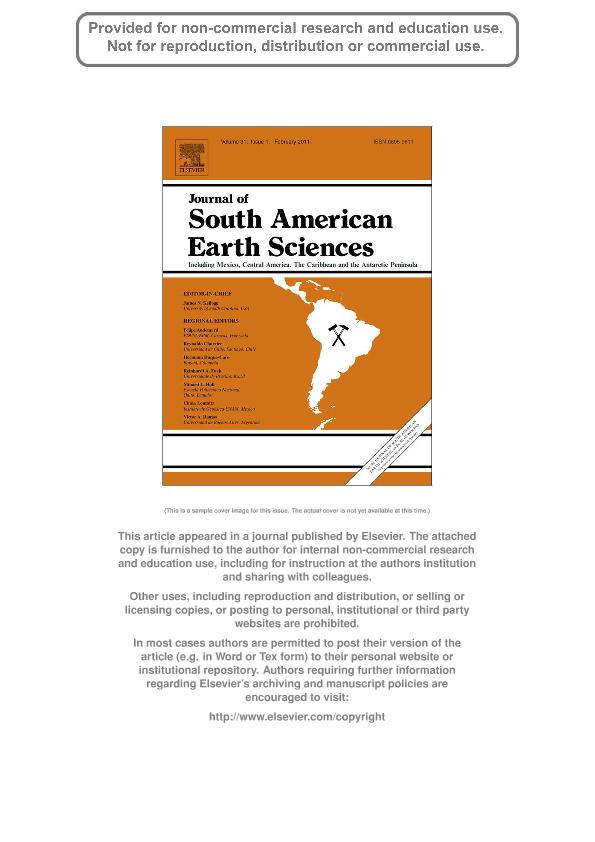Mostrar el registro sencillo del ítem
dc.contributor.author
Zurita, Alfredo Eduardo

dc.contributor.author
Carlini, Alfredo Armando

dc.contributor.author
Gillette, David
dc.contributor.author
Sánchez, Rodolfo
dc.date.available
2018-04-11T15:22:11Z
dc.date.issued
2011-03
dc.identifier.citation
Zurita, Alfredo Eduardo; Carlini, Alfredo Armando; Gillette, David; Sánchez, Rodolfo; Late Pliocene Glyptodontinae (Xenarthra, Cingulata, Glyptodontidae) of South and North America: Morphology and paleobiogeographical implications in the GABI; Pergamon-Elsevier Science Ltd; Journal of South American Earth Sciences; 31; 2-3; 3-2011; 178-185
dc.identifier.issn
0895-9811
dc.identifier.uri
http://hdl.handle.net/11336/41714
dc.description.abstract
Knowledge of the main aspects of the Great American Biotic Interchange (GABI) concerning the glyptodontine Glyptodontidae (Xenarthra) is very scarce. A bidirectional dispersal processwas recently proposed for this clade, with the presence of the North American genus Glyptotherium Osborn recognized in latest Pleistocene sediments of northern South America (Venezuela and Brazil). However, the earliest stages of this paleobiogeographical process remain poorly understood, mainly because of the limited fossil record on this clade in late Pliocene sediments. The goals of this contribution are: a) to present and describe the first record of a glyptodontine glyptodontid from the late Pliocene of northern South America, tentatively assigned to a new species of Boreostemma Carlini et al. (Boreostemma? sp. nov); and b) to analyze its paleobiogeographical implications with respect to the GABI. This new materialwas recovered from the San Gregorio Formation (late Pliocene, prior theGABI) in northern Venezuela, where it is represented by several osteoderms of the dorsal carapace. A comparison among the three known late Pliocene glyptodontine glyptodontids of a) southern South America (Paraglyptodon), b) northern South America (Boreostemma), and c) southern NorthAmerica ("Glyptotherium"), reveals a series of shared characters between (b) and (c), not present in (a). The most important of these shared characters in (b) and (c) are: all the osteoderms present a great development of the central figure, which is always larger than the peripherals; the sulcus that delimits the central and peripheral figures is narrower and shallower; and all the osteoderms present are relatively thin. This evidence suggests that the lineage of Glyptodontinae which participated in theGABI and subsequently diversified in North America originated in northern South America. Moreover, the evident morphological differences between these glyptodontines with respect to the southern South American forms show a significant separation of both lineages since at least latest Miocene-early Pliocene.
dc.format
application/pdf
dc.language.iso
eng
dc.publisher
Pergamon-Elsevier Science Ltd

dc.rights
info:eu-repo/semantics/openAccess
dc.rights.uri
https://creativecommons.org/licenses/by-nc-sa/2.5/ar/
dc.subject
Glyptodontinae
dc.subject
Boreostemma? Sp. Nov.
dc.subject
Gabi
dc.subject
Paleobiogeography
dc.subject
Late Pliocene
dc.subject
Taxonomy
dc.subject.classification
Meteorología y Ciencias Atmosféricas

dc.subject.classification
Ciencias de la Tierra y relacionadas con el Medio Ambiente

dc.subject.classification
CIENCIAS NATURALES Y EXACTAS

dc.title
Late Pliocene Glyptodontinae (Xenarthra, Cingulata, Glyptodontidae) of South and North America: Morphology and paleobiogeographical implications in the GABI
dc.type
info:eu-repo/semantics/article
dc.type
info:ar-repo/semantics/artículo
dc.type
info:eu-repo/semantics/publishedVersion
dc.date.updated
2018-04-05T18:17:01Z
dc.journal.volume
31
dc.journal.number
2-3
dc.journal.pagination
178-185
dc.journal.pais
Países Bajos

dc.journal.ciudad
Amsterdam
dc.description.fil
Fil: Zurita, Alfredo Eduardo. Consejo Nacional de Investigaciones Científicas y Técnicas. Centro Científico Tecnológico Conicet - Nordeste. Centro de Ecología Aplicada del Litoral. Universidad Nacional del Nordeste. Centro de Ecología Aplicada del Litoral; Argentina
dc.description.fil
Fil: Carlini, Alfredo Armando. Consejo Nacional de Investigaciones Científicas y Técnicas; Argentina. Universidad Nacional de la Plata. Facultad de Ciencias Naturales y Museo. División Paleontología Vertebrados; Argentina
dc.description.fil
Fil: Gillette, David. Museum of Northern Arizona; Estados Unidos
dc.description.fil
Fil: Sánchez, Rodolfo. Museo Paleontológico de la Alcaldía de Urumaco; Venezuela
dc.journal.title
Journal of South American Earth Sciences

dc.relation.alternativeid
info:eu-repo/semantics/altIdentifier/doi/http://dx.doi.org/10.1016/j.jsames.2011.02.001
dc.relation.alternativeid
info:eu-repo/semantics/altIdentifier/url/https://www.sciencedirect.com/science/article/pii/S0895981111000095
Archivos asociados
